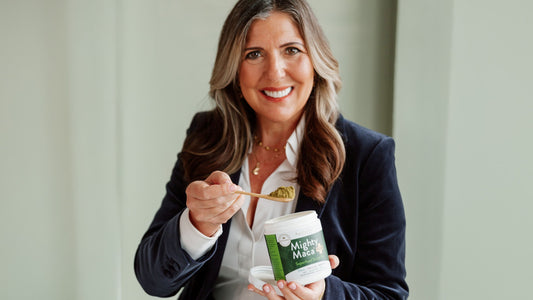Menopause is a natural transition that deserves compassionate and expert care.
However, when it comes to this stage of life, so many women find themselves dismissed by their providers or left behind by one-size-fits-all treatments. Gynecologists are often given little to no special education about menopause. And let’s face it, a lot of doctors will give you only a few minutes of their time — which leaves you feeling unheard and unseen.
If you’ve been struggling to find a professional who truly listens and addresses your unique symptoms, you’re not alone.
In this article, you will learn:
How to identify menopause specialists
Key questions to evaluate a potential provider
Resources to locate the best expert in your area
Let’s dive in and explore how you can confidently find a menopause specialist who understands your needs.


Not all doctors are equipped to handle the complexities of menopause. While many general practitioners or OB-GYNs may provide very basic menopause care, a menopause specialist has advanced training in hormone health, symptom management, and whole-body wellness during this life stage.
Different Types Of Menopause Care Providers
General Practitioners (GPs) — Offer basic menopause support but may lack specialized training in hormone balance.
Gynecologists (OB-GYNs) — Some focus on menopause, but many prioritize reproductive health and may not specialize in functional medicine approaches.
Endocrinologists — Specialists in hormone health but often focus on conditions like diabetes and thyroid disorders rather than menopause specifically.
Functional Medicine Doctors — Take a root-cause approach to menopause, focusing on hormones, gut health, nutrition, and lifestyle.
Sexual Health Professionals — Healthcare providers who specialize in sexual health and well-being. This may include sex counselors and therapists.


A menopause specialist, especially one trained in functional medicine, can make a huge difference in your quality of life — so it’s worth seeking one out.
The Functional Medicine Approach To Menopause
Conventional medicine often treats menopause with a one-size-fits-all approach—offering antidepressants for mood swings, birth control for hormone imbalances, or simply telling women to "push through" their symptoms.
Functional medicine, on the other hand, takes a root-cause approach, recognizing that menopause is not just about declining hormones but also about gut health, inflammation, stress, and lifestyle factors.
How Functional Medicine Differs from Conventional Menopause Care


Key Benefits Of Functional Medicine For Menopause
Comprehensive Hormone Testing: Instead of assuming your hormones are “fine,” functional doctors test estrogen, progesterone, testosterone, thyroid function, and adrenal health to create a customized treatment plan.
Personalized Nutrition & Gut Health Support: Many menopause symptoms (brain fog, bloating, weight gain) are linked to gut imbalances, which functional doctors address with diet, probiotics, and digestive support.
Natural & Bioidentical Hormone Therapy: Functional medicine specialists often prefer bioidentical hormones over synthetic ones, as they are structurally identical to the hormones your body naturally produces.
Whole-Body Wellness Approach: Rather than treating menopause as a singular issue, functional medicine looks at stress levels, sleep quality, inflammation, and metabolic health to improve overall well-being.
Functional medicine is about empowerment and personalized care — helping you feel your best during and after menopause.
How To Find The Right Menopause Specialist For You
If I was starting over in a new city and needed to find a doctor, here’s where I’d personally start to look:
The Institute for Functional Medicine (IFM) Certified Practitioner Finder
North American Menopause Society (NAMS) Database
American Academy of Anti-Aging Medicine (A4M) Directory
Then, I’d look for Google reviews, patient testimonials, and menopause forums for recommendations. Social media groups on Facebook or Reddit can offer valuable firsthand experiences.
Red Flags: Signs A Doctor May Not Be The Right Fit
🚩 Dismisses Your Symptoms – If they tell you symptoms like brain fog, mood swings, or sleep issues are "just part of aging," look elsewhere.
🚩 Pushes a One-Size-Fits-All Approach – Beware of doctors who prescribe birth control, antidepressants, or even HRT without considering your unique needs.
🚩 Doesn’t Test Your Hormones Properly – A functional menopause specialist should run a full hormone panel, including estrogen, progesterone, testosterone, cortisol, and thyroid markers—not just a single test.
🚩 Ignores Lifestyle & Nutrition – If the doctor only focuses on medication and never discusses diet, gut health, sleep, or stress management, they may not align with a holistic approach.
What to Expect In Functional Menopause Care
Unlike conventional care, which often relies on quick prescriptions, functional medicine takes a personalized and holistic approach to managing menopause.
Here’s what that process typically looks like:


Your first appointment might involve:
Detailed Health History – Reviewing past and present symptoms, medical conditions, and lifestyle factors.
Hormone Testing – A full panel measuring estrogen, progesterone, testosterone, cortisol, thyroid function, and insulin resistance. Some specialists may also use saliva or DUTCH hormone testing for more precise results.
Nutrient & Gut Health Testing – Assessing deficiencies in vitamin D, B12, magnesium, and omega-3s, along with checking gut microbiome imbalances that could impact metabolism and inflammation.


Functional menopause care doesn’t rely on one-size-fits-all treatments. Your doctor will tailor your plan based on lab results, lifestyle, and specific symptoms.
They may devise a treatment plan that includes:
Bioidentical Hormone Replacement Therapy (BHRT) — If needed, bioidentical hormones (plant-based and molecularly identical to your body’s hormones) may be prescribed for symptom relief.
Natural Hormone Support — Some doctors recommend herbs and supplements like maca root, black cohosh, DIM, and adaptogens to support hormonal balance naturally.
Gut & Metabolic Health Support — Many menopause symptoms (bloating, fatigue, and brain fog) stem from gut imbalances. Probiotics, digestive enzymes, and an anti-inflammatory diet (full of healthy fats, veggies, and protein) can help improve digestion and energy levels.
Nutritional & Lifestyle Adjustments — They may counsel you to change your diet and avoid processed foods, refined sugar, and excessive alcohol.
Stress management – Yoga, meditation, and breathwork to lower cortisol and support adrenal health.
Strength training & movement – Functional medicine focuses on muscle preservation and bone health to counteract menopause-related muscle loss.


A functional medicine specialist doesn’t just prescribe a treatment and send you on your way.
Expect follow-ups every 3-6 months to reassess hormone levels and tweak your plan as needed.
Adjustments may include tweaking BHRT dosages, modifying diet, or adding new supplements based on progress.
Functional medicine takes a whole-body, proactive approach to menopause care, helping you feel your best long-term, rather than just masking symptoms.
Costs Of Functional Medicine Office Visits And Tests
Functional medicine is not usually covered by traditional insurance, but you may be able to use HSA or FSA.
And the costs vary widely from state to state, and doctor to doctor.
Some doctors only offer packages that can cost in the thousands.
And others charge separately for office visits and tests. It really just depends on the doctor.
Here are some estimations of fees you may encounter during this journey:
Initial consultation: $250 – $600 (varies based on provider experience and location)
Comprehensive hormone & metabolic testing: $300 – $900 (saliva or DUTCH tests may cost extra)
Gut microbiome or advanced nutrient testing: $200 – $500 and up
BHRT (bioidentical hormone therapy): $50 – $200/month (depends on formulation and pharmacy)
Natural supplements & herbs: $30 – $150/month
Professional-grade probiotics & gut health supplements: $40 – $100/month
Custom nutrition plans & health coaching: $100 – $300/session (some doctors include this in their programs)
Personalized fitness & wellness coaching: $50 – $200/session
Meditation/mindfulness programs: Free – $50/month for apps & guided courses
Follow-up consultations: $150 – $400 per visit
Ongoing lab work: $200 – $600 (depending on the extent of testing)
While functional medicine is an investment, many women find that the personalized approach leads to better symptom relief and long-term health improvements compared to conventional care.
How To Find A Menopause Specialist
Finding a menopause specialist who truly listens and offers a functional medicine approach can transform your health and quality of life. Instead of simply masking symptoms with medications, the right doctor will help you balance hormones, optimize gut health, and support overall well-being through personalized care.
But this approach can be costly.
That’s why I created my group program, Magic Menopause …to give you access to the best in menopause support, without the hefty price tag.
During this 8-week journey, we’ll work together through my proven, functional-inspired process to help you feel like yourself again.
We’ll tackle:
Hormone balance
Inflammation support
Stress
Toxins
Blood sugar balance
And SO much more!
This is truly a rare opportunity to become your own menopause specialist, alongside other women in a very special community led by me.
Click here to get on the waitlist for this *magical* experience!











